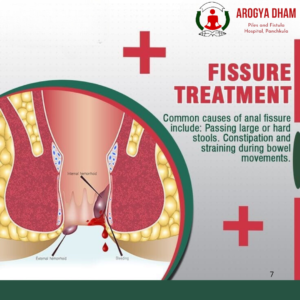📞 +91 9814611971 📞+91 981460097 📧 aarogyadhampkl@gmail.com
Fissures
Anal Fissure: Causes, Symptoms, and How to Manage Anal Fissures at Arogyadham Clinic
Introduction to Anal Fissures
Anal fissures, though a common condition, are often misunderstood and can lead to significant discomfort, affecting a person’s quality of life. An anal fissure is a small tear or crack in the skin of the anus, often causing sharp pain and discomfort during or after bowel movements. If left untreated, fissures can become chronic, leading to more severe complications.
 At Arogyadham Clinic in Panchkula, we specialize in the treatment of piles, fistula, and fissures, offering both modern and traditional Ayurvedic treatment options. One such highly effective treatment we provide is Kshar Sutra, an Ayurvedic parasurgical technique that is proven to offer relief from fissures and other anorectal conditions.
At Arogyadham Clinic in Panchkula, we specialize in the treatment of piles, fistula, and fissures, offering both modern and traditional Ayurvedic treatment options. One such highly effective treatment we provide is Kshar Sutra, an Ayurvedic parasurgical technique that is proven to offer relief from fissures and other anorectal conditions.
In this article, we will explore the causes, symptoms, and Fissure treatment options for anal fissures, and explain how our unique approach at Arogyadham Clinic can help you manage this condition effectively.
What Causes Anal Fissures?
Anal fissures occur when the skin around the anus becomes torn, leading to pain and discomfort. Several factors can contribute to the development of anal fissures. Some of the most common causes include:
- Chronic Constipation: One of the primary causes of anal fissures is chronic constipation. When stools are hard and difficult to pass, they can tear the sensitive skin around the anus. Straining during bowel movements can worsen the problem, leading to recurring fissures.
- Diarrhea: Just as constipation can cause fissures, so can diarrhea. Frequent bowel movements, especially those that are watery or forceful, can irritate the skin around the anus and lead to fissures.
- Childbirth: Women who have recently given birth, especially through vaginal delivery, may experience anal fissures due to the pressure exerted during labor. The skin may tear during delivery, leading to fissures.
- Anal Intercourse: Anal intercourse can also cause physical trauma to the delicate skin of the anus, leading to tears or fissures. This is a risk factor for those who engage in this activity.
- Low-Fiber Diet: A low-fiber diet can lead to constipation, which in turn increases the risk of developing fissures. Fiber helps to soften stool, making it easier to pass.
- Medical Conditions: Certain medical conditions, such as Crohn’s disease, ulcerative colitis, and HIV, can increase the risk of developing anal fissures due to the chronic inflammation they cause in the gastrointestinal tract.
- Poor Hygiene: Inadequate cleaning after bowel movements can lead to irritation and skindamage, making the anal area more susceptible to tears.
Symptoms of Anal Fissures
The symptoms of anal fissures can vary from mild to severe, depending on the severity and duration of the tear. Common symptoms include:
- Sharp Pain During Bowel Movements: The most noticeable symptom of an anal fissure is a sharp pain during or after bowel movements. The pain can be intense and may last for hours after the bowel movement.
- Blood in Stool: A small amount of bright red blood on the toilet paper or in the stool is common in people with anal fissures. The blood is usually seen as streaks on the stool’s surface.
- Itching or Irritation: The area around the anus may become itchy or irritated, especially after passing a stool. The skin may become sore and inflamed due to the tear.
- Visible Tear: In some cases, a visible tear or crack may be observed in the skin around the anus. This tear can be small but extremely painful.
- Pain After Sitting: Sitting for long periods can exacerbate the pain of an anal fissure, leading to discomfort even when you’re not using the bathroom.
How to Manage and Treat Fissures at Arogyadham Clinic
At Arogyadham Clinic, we offer a variety of Fissure treatment options to manage and heal anal fissures. Our holistic approach combines both modern medicine and traditional Ayurvedic methods, ensuring a comprehensive solution to the problem. Here’s how we can help:
1. Ayurvedic Kshar Sutra Treatment
One of the most effective Ayurvedic treatments for anal fissures is Kshar Sutra, a parasurgical technique. Kshar Sutra involves the application of a medicated thread (suture) to the affected area. The thread is made from natural herbs and substances that possess anti-inflammatory and healing properties.
The process is as follows:
- The Kshar Sutra is applied to the fissure area.
- The thread works by gradually promoting healing, reducing inflammation, and eliminating the infection.
- It also helps in reducing pain and discomfort associated with anal fissures.
Unlike traditional surgery, Kshar Sutra is minimally invasive, has fewer side effects, and ensures faster healing with a quicker recovery time. Many patients find significant relief from symptoms after a few applications.
2. Dietary Modifications
At Arogyadham Clinic, we emphasize the role of diet in managing and preventing anal fissures. A high-fiber diet is crucial in keeping the stool soft and preventing constipation. We provide personalized dietary guidelines that include:
- Increasing fiber intake through fruits, vegetables, and whole grains.
- Drinking plenty of water to stay hydrated.
- Avoiding foods that can irritate the digestive system, such as spicy foods and alcohol.
3. Sitz Baths
A simple yet effective way to manage anal fissures is through sitz baths. Soaking the anal area in warm water for 10-15 minutes can help relax the muscles, reduce inflammation, and provide immediate pain relief. We recommend this as a part of our holistic treatment plan for fissures.
4. Topical Medications
We also offer topical medications, such as numbing creams and ointments that help alleviate pain and promote healing. These medications are used as part of the treatment plan to reduce discomfort and inflammation.
5. Non-Surgical Options
If the fissure is not healing despite conservative treatments, our doctors may recommend non-surgical options like Botox injections to relax the anal sphincter muscle, which can help in the healing process. This option is particularly useful in cases where chronic anal spasms are preventing the fissure from healing.
When to Seek Medical Help
If you experience persistent pain, bleeding, or discomfort around the anus, it’s essential to seek medical advice. Early treatment can prevent the condition from worsening and help avoid chronic complications like anal abscesses or fistulas.
 Conclusion
Conclusion
Anal fissures can be a painful and disruptive condition, but with the right treatment, they can be managed effectively. At Arogyadham Clinic in Panchkula, we specialize in a holistic approach to treating anal fissures, combining the best of Ayurvedic and modern medical treatments. Kshar Sutra, a unique Ayurvedic parasurgical technique, is one of the most effective methods we offer for long-lasting relief.
If you’re suffering from anal fissures or other anorectal conditions, don’t wait for the pain to worsen. Reach out to Arogyadham Clinic for a consultation and take the first step towards a pain-free life.
For more information on Kshar Sutra treatment, visit our page on Kshar Sutra Treatment.